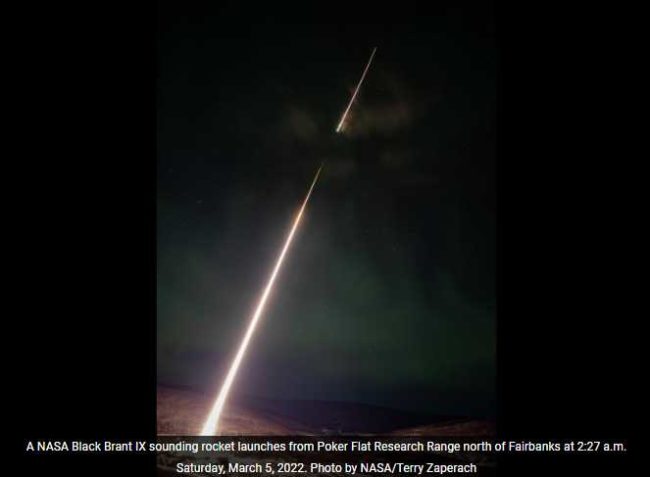A NASA Black Brant IX sounding rocket soared high out of Poker Flat Research Range north of Fairbanks at 2:27 a.m. Saturday to learn more about pulsating aurora.
The Loss through Auroral Microburst Pulsations, or LAMP, experiment seeks to determine whether the pulsating aurora is connected to another phenomenon called microbursts, higher-energy electrons from the Earth’s magnetosphere driven toward Earth in bursts that last about one-tenth of a second. That is faster than the pulsating aurora but similar to the flickering inside the pulsations.
A pulsating aurora looks patchy and occurs within minutes or sometimes hours after the conclusion of a discrete aurora, the familiar curtain-like type of aurora.
The launch had been repeatedly postponed since the Feb. 24 opening of the launch window because scientists needed the right combination of active aurora and good weather at a camera site in Venetie, which is located more than 130 miles north of the range.
Weather and aurora activity improved in recent days. Alexa Halford, space physics researcher at NASA’s Goddard Space Flight Center and the experiment’s lead investigator, detected pulsating aurora over Venetie early Saturday and determined that launch conditions were favorable.
“This was an amazing launch,” Halford said. “We couldn’t have asked for anything better, and it was all due to the science team, the NASA Wallops Flight Facility and Poker Flat Research Range people as well as the support and help from the communities of Venetie and Fort Yukon. Without them we wouldn’t have had everything we needed, especially the ground stations.”
Good data was received from all instruments aboard the sounding rocket.
“The rocket flew as true as one could hope for and into an aurora event that was better than anything we could have asked for,” she said. “We are still all riding high and can’t wait to start working on the data.”
The launch was the first at Poker Flat since January 2020.
The University of Alaska Fairbanks Geophysical Institute owns Poker Flat, located at Mile 30 Steese Highway, and operates it under a contract with NASA’s Wallops Flight Facility, which is part of the Goddard Space Flight Center.
Source:

